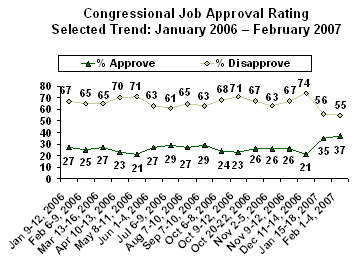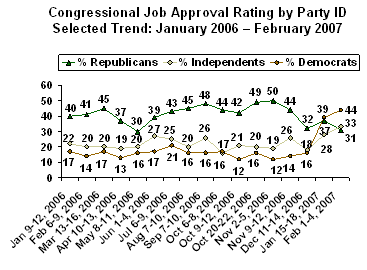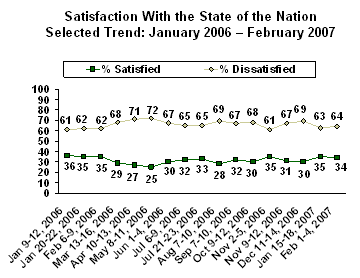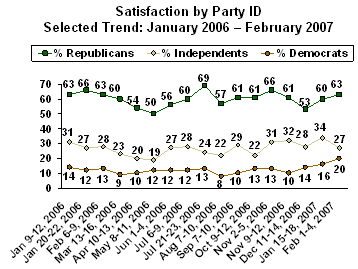GALLUP NEWS SERVICE
PRINCETON, NJ -- Â鶹´«Ã½AV's monthly update on key trends and indicators finds little change this month in Americans' approval ratings of Congress and in their overall satisfaction with the state of the nation. This marks the second poll in a row in which congressional job approval is well above the average approval for the year 2006. Satisfaction with the way things are going has also shown improvement so far this year in comparison with last year. In the last month, Democrats have become more likely than Republicans to say they approve of the job Congress is doing. Democrats have also gradually become more likely to say they are satisfied with the state of the nation, though Republicans continue to express higher levels of satisfaction. The war in the Iraq continues to be the dominant problem facing the country in the eyes of the public.
Congressional Job Approval
According to the Feb. 1-4, 2007 poll, 37% of Americans approve and 55% disapprove of the job Congress is doing.
Americans' ratings of Congress are at roughly the same level Â鶹´«Ã½AV found last month (35%), and both months' readings are higher than at any other point over the past year. In 2006, congressional job approval ratings averaged 25%, with a high of 29% and a low of 21%. The last time congressional job approval ratings were as high as the current level was in April 2005, when 38% approved of the job Congress was doing.

When the Democrats took control of both houses of Congress last month, Democrats' ratings of Congress improved substantially. The latest poll shows 44% of Democrats approve of the job Congress is doing, much higher than the 33% approval among independents and the 31% among Republicans. Last month, Democrats (39%) and Republicans (37%) rated Congress equally. Republicans were much more likely than independents and Democrats to approve of Congress throughout all of 2006.

Mood of the Nation
The poll also finds that 34% of Americans say they are satisfied with the way things are going in the country right now, while the majority of Americans, 64%, say they are dissatisfied. The current results are similar to the 35% satisfaction from last month and are slightly higher so far this year compared with what Â鶹´«Ã½AV measured at the end of last year. Just about 3 in 10 Americans expressed satisfaction in November and December, following the midterm congressional elections. The average percentage of Americans saying they are satisfied with the state of the nation was 31% in 2006 with a low of 25% in May and a high of 36% in January.

Â鶹´«Ã½AV's current 34% satisfaction reading is quite low historically. Since 1979, the average percentage of Americans saying they are satisfied with conditions in the country has been 43%, falling as low as 12% in July 1979 and reaching as high as 71% in February 1999.
Sixty-three percent of Republicans say they are satisfied with the way things are going, while 27% of independents and 20% of Democrats agree. Republicans have consistently expressed a higher level of satisfaction than independents or Democrats over the past year. But, Democrats' satisfaction has been slowly edging up in recent months and is now higher than at any point in the past year.

Most Important Problem
As it does each month, Â鶹´«Ã½AV asked Americans to name, in their own words, the "most important problem facing this country today." The war in Iraq continues to rank at the top of the list, with 38% of Americans saying this is the nation's most salient problem. The percentage of Americans mentioning Iraq as the top problem is not statistically different than the 36% that mentioned it last month, but it is technically the highest percentage doing so since the war began.
After Iraq, the next most common concerns are healthcare issues (8%), the general state of the economy (7%), government dissatisfaction and corruption (7%), and terrorism (7%).
|
Most Important Problem Facing the Country Today, Feb. 1-4, 2007 |
|
|
% |
|
|
ECONOMIC PROBLEMS (NET) |
22 |
|
Economy in general |
7 |
|
Unemployment/jobs |
4 |
|
Fuel/Oil prices |
3 |
|
Federal budget deficit/federal debt |
2 |
|
Gap between rich and poor |
2 |
|
Lack of money |
1 |
|
High cost of living/inflation |
1 |
|
Taxes |
1 |
|
Wage issues |
1 |
|
Corporate corruption |
1 |
|
Ìý |
|
|
NON-ECONOMIC PROBLEMS (NET) |
82 |
|
Situation in Iraq/war |
38 |
|
Poor healthcare/ hospitals; high cost of healthcare |
8 |
|
Dissatisfaction with government/ Congress/ politicians/ candidates; Poor leadership; corruption |
7 |
|
Terrorism |
7 |
|
Immigration/illegal aliens |
5 |
|
Environment/ pollution |
5 |
|
Ethics/moral/religious/family decline; dishonesty; lack of integrity |
4 |
|
Education/poor education/access to education |
3 |
|
Poverty/ hunger/ homelessness |
3 |
|
Foreign aid/focus overseas |
3 |
|
International issues/ problems |
2 |
|
Drugs |
2 |
|
National security |
1 |
|
Lack of respect for each other |
1 |
|
Unifying the country |
1 |
|
Crime/violence |
1 |
|
Lack of energy sources; the energy crisis |
1 |
|
War in the Middle East |
1 |
|
Ìý |
|
|
Other non-economic |
4 |
|
Ìý |
|
|
No opinion |
3 |
|
Total |
123% |
|
Note: percentage mayÌýtotal more than 100% due to multiple responses. |
|
The war in Iraq is the top-named problem among Republicans, independents, and Democrats, but Democrats (46%) mention it more frequently than Republicans (28%). Republicans are more likely than Democrats to mention terrorism (13% vs. 5%) and immigration (10% vs. 3%). Democrats mention healthcare issues twice as frequently as Republicans (12% vs. 6%). There are only modest variations between Republicans' and Democrats' mentions of government dissatisfaction and corruption, the environment, or the economy.
|
Most Important Problem by Party Affiliation, Feb. 1-4, 2007 |
|||
|
Reps. |
Inds. |
Dems. |
|
|
% |
% |
% |
|
|
Situation in Iraq/war |
28 |
39 |
46 |
|
Poor healthcare/hospitals; high cost of healthcare |
6 |
6 |
12 |
|
Economy in general |
4 |
9 |
8 |
|
Dissatisfaction with government/ Congress/politicians/candidates; Poor leadership; corruption |
7 |
8 |
5 |
|
Terrorism |
13 |
4 |
5 |
|
Immigration/illegal aliens |
10 |
4 |
3 |
|
Environment/pollution |
1 |
7 |
5 |
Survey Methods
Results are based on telephone interviews with 1,007 national adults, aged 18 and older, conducted Feb. 1-4, 2007. For results based on the total sample of national adults, one can say with 95% confidence that the maximum margin of sampling error is ±3 percentage points. In addition to sampling error, question wording and practical difficulties in conducting surveys can introduce error or bias into the findings of public opinion polls.